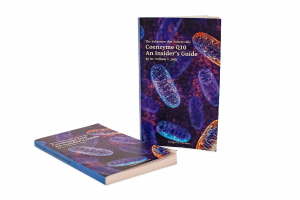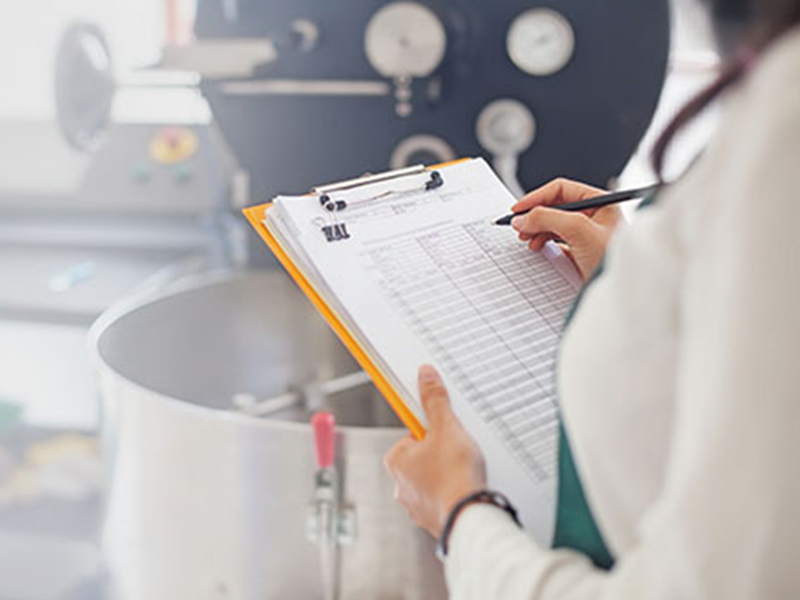
Dr. William V. Judy, founder and president of the SIBR Research Institute, has written about the clinical aspects of CoQ10 supplementation in his 2018 book entitled Coenzyme Q10: An Insider’s Guide. The book is highly recommended. It is available from amazon.com.
Coenzyme Q10 is a bio-nutrient essential to the process of ATP energy generation in the cells. It is also an important fat-soluble antioxidant. It helps to maintain proper endothelial function regulating vascular contraction and relaxation and regulating the enzymes that control blood clotting, immune function, and platelet adhesion. It has anti-inflammatory properties [Littarru 2010]. Our primary source of Coenzyme Q10 is our bodies’ bio-synthesis of the substance. Our food contributes considerably less Coenzyme Q10.
Decreasing CoQ10 Bio-Synthesis with Increasing Age
Once we reach our adult years, our bodies’ bio-synthesis of Coenzyme Q10 begins to decrease with increasing age. One estimate is that the endogenous production of Coenzyme Q10 in the cells of the heart muscle will be half the level at age 80 as it is as age 20 [Kalén]. Furthermore, some prescription medications, most notably statin medications, will interfere with the body’s bio-synthesis of Coenzyme Q10 [Okuyama 2015]. Supplementation is a must as we pass middle age and head into the senior years and especially if we are taking a statin medication.
Aggregation of CoQ10 Data in Meta-Analyses
Over the years, researchers have conducted many hundreds of clinical trials of the effects of CoQ10 supplementation. In the years 2017 – 2019, several researchers have aggregated the data from these clinical trials in meta-analyses to get an overall picture. In this article, I want to summarize some of these meta-analyses.
Coenzyme Q10 and Blood Pressure
Tabrizi et al analyzed the data from 17 randomized controlled trials enrolling 684 patients diagnosed with metabolic diseases. Their results showed that CoQ10 supplementation significantly decreased systolic blood pressure. CoQ10 supplementation was also associated with a decrease in diastolic blood pressure, but this association did not reach the level of statistical significance (p = 0.08) [Tabrizi 2018].
An earlier meta-analysis of 12 clinical trials enrolling 362 patients with high blood pressure – three randomized controlled trials, one crossover study, and eight open label studies – showed that CoQ10 supplementation “has the potential in hypertensive patients to lower systolic blood pressure by up to 17 mm Hg and diastolic blood pressure by up to 10 mm Hg without significant side effects” [Rosenfeldt 2007].
Coenzyme Q10 and Blood Lipid Levels
Jorat et al examined eight clinical trials enrolling 267 patients in the intervention groups and 259 patients in placebo groups. Their findings showed that CoQ10 supplementation of patients with coronary artery disease significantly decreased total cholesterol levels and significantly increased HDL-cholesterol levels. The researchers found no statistically significant effects of CoQ10 supplementation on LDL-cholesterol levels and on triglycerides [Jorat 2018].
CoQ10 Supplementation and Type-2 Diabetes Mellitus
S. Zhang et al analyzed the data from 13 clinical trials involving 765 patients. The CoQ10 intervention significantly decreased the patients’ HbA1c levels and fasting blood glucose levels as compared with the control patients’ levels. There was no statistically significant difference in fasting insulin levels between the intervention group and the control group. Based on the data from the 13 studies, the researchers concluded that CoQ10 supplementation may improve glycemic control, decrease triglyceride levels, and improve HDL-cholesterol levels in patients with Type-2 Diabetes mellitus [Zhang 2018].
X. Zhang et al compiled the data from eight studies (four randomized controlled trials and four experimental studies) of patients with diabetic kidney disease. They found that the CoQ10 intervention was significantly superior to the placebo intervention with respect to the following parameters [Zhang 2019]:
- fasting plasma glucose
- HbA1c
- total cholesterol
- HDL-cholesterol
- triglycerides
- malondialdehyde (a bio-marker for oxidative stress)
The CoQ10 treatment did not have a statistically significant effect on LDL-cholesterol levels as compared to the placebo treatment [Zhang 2019].
CoQ10 Supplementation and Heart Failure
Lei and Liu conducted a meta-analysis of 14 randomized controlled trials enrolling 2149 heart failure patients. The heart failure patients in the CoQ10 active treatment groups had significantly lower mortality rates and higher exercise capacity improvements than did the placebo-treated heart failure patients. The available data did not show any statistically significant differences between the two groups with respect to left ventricular ejection fraction and NYHA classification status [Lei & Liu 2017].
Jafari et al extracted data from seven previous systematic reviews of CoQ10 supplementation and heart failure. Overall, the researchers found that CoQ10 supplementation is positively associated with the following beneficial heart health effects [Jafari]:
- increase in ejection fraction
- improvement in NYHA functional classification
- improved clinical status and survival
- improved quality of life

Dr. Svend Aage Mortensen, University of Copenhagen Hospital, was the lead researcher on the Q-Symbio Study of the effects of CoQ10 adjuvant treatment of chronic heart failure patients. CoQ10 treatment in addition to conventional heart failure medication significantly improved the patients’ symptoms and survival.
Especially important in this regard is the Q-Symbio Study. It was the first randomized, double-blind, placebo-controlled study with adequate sample size (420 heart failure patients), sufficient dosage of Coenzyme Q10 (3 times 100 milligram per day, with meals), and long enough follow-up duration (2 years) to test the efficacy of CoQ10 adjunctive therapy on major adverse cardiovascular events and mortality in heart failure.
The Q-Symbio study results showed that treatment with Coenzyme Q10 in addition to conventional medication for patients with moderate to severe HF is safe and well-tolerated and is associated with a significant reduction in the patients’ symptoms and survival [Mortensen 2014; Mortensen 2019]. In the European segment of the study, the CoQ10 adjuvant treatment was significantly associated with improved left ventricular ejection fraction [Mortensen 2019].
CoQ10 Supplementation of Patients with Migraine
Parohan et al analyzed the results from four randomized controlled trials enrolling 221 participants. Their results showed that CoQ10 supplementation significantly reduced the frequency of migraine attacks; however, in these four studies, the CoQ10 supplementation did not have a statistically significant effect on the severity of the migraine attacks or on the duration of the migraine attacks [Parohan 2019].
Zeng et al did a meta-analysis of five studies with 346 migraine patients (120 pediatric and 226 adult subjects). The CoQ10 supplementation was significantly more effective than placebo in reducing the number of days per month with migraine and in reducing the duration of the migraine attacks. With respect to the severity of the migraine attacks, the CoQ10 intervention group was comparable to the placebo control group [Zeng 2019].
CoQ10 Supplementation and Statin-Induced Myopathies
Qu et al examined the data from 12 randomized controlled trials enrolling 575 patients (294 patients in the CoQ10 supplementation group and 281 in the placebo group). Compared with placebo, CoQ10 supplementation significantly relieved statin-associated muscle symptoms such as muscle pain, muscle weakness, muscle cramp, and muscle tiredness.
The researchers concluded that CoQ10 supplementation ameliorated statin-associated muscle symptoms. One implication of this outcome is that CoQ10 supplementation may be a suitable complement to the administration of statin medications [Qu 2018].
CoQ10 Supplementation is Safe, Effective, and Affordable
CoQ10 supplementation is a good choice with respect to cellular bio-energetics, cellular antioxidant defense, and healthy ageing.
The choice of the CoQ10 supplement requires thought. The absorption and bio-availability of the CoQ10 supplement – and therefore the efficacy – varies considerably from product to product. It is best to select a CoQ10 supplement for which there is documented scientific proof of absorption and bio-availability.
Sources
Jafari M, Mousavi SM, Asgharzadeh A & Yazdani N. Coenzyme Q10 in the treatment of heart failure: A systematic review of systematic reviews. Indian Heart J. 2018 Jul;70 Suppl 1: S111-S117.
Jorat MV, Tabrizi R, Mirhosseini N, Lankarani KB, Akbari M, Heydari ST, Mottaghi R & Asemi Z. The effects of coenzyme Q10 supplementation on lipid profiles among patients with coronary artery disease: a systematic review and meta-analysis of randomized controlled trials. Lipids Health Dis. 2018 Oct 9;17(1):230.
Kalén, A.; Appelkvist, E.-L.; Dallner, G. Age-related changes in the lipid compositions of rat and human tissues. Lipids 1989, 24, 579–584.
Lei L & Liu Y. Efficacy of coenzyme Q10 in patients with cardiac failure: a meta-analysis of clinical trials. BMC Cardiovasc Disord. 2017 Jul 24;17(1): 196.
Littarru GP & Tiano L. Clinical aspects of coenzyme Q10: an update. Nutrition. 2010 Mar;26(3): 250-4.
Mortensen, SA, Rosenfeldt, F, Kumar, A, Dolliner, P, Filipiak, KJ, Pella, D, & Littarru, GP. The effect of coenzyme Q10 on morbidity and mortality in chronic heart failure: results from Q-SYMBIO: a randomized double-blind trial. JACC. Heart Failure. 2014; 2(6), 641-649.
Mortensen, AL, Rosenfeldt, F, & Filipiak, KJ. Effect of Coenzyme Q10 in Europeans with chronic heart failure: A sub-group analysis of the Q-Symbio randomized double-blind study. Cardiology Journal. 2019; 26(2): 147-156.
Okuyama H, Langsjoen PH, Hamazaki T, Ogushi Y, Hama R, Kobayashi T & Uchino H. Statins stimulate atherosclerosis and heart failure: pharmacological mechanisms. Expert Review of Clinical Pharmacology. 2015; 8(2), 189-199.
Parohan M, Sarraf P, Javanbakht MH, Ranji-Burachaloo S & Djalali M. Effect of coenzyme Q10 supplementation on clinical features of migraine: a systematic review and dose-response meta-analysis of randomized controlled trials. Nutr Neurosci. 2019 Feb 6: 1-8.
Qu H, Guo M, Chai H, Wang WT, Gao ZY & Shi DZ. Effects of Coenzyme Q10 on Statin-Induced Myopathy: An Updated Meta-Analysis of Randomized Controlled Trials. J Am Heart Assoc. 2018 Oct 2;7(19): e009835.
Rosenfeldt F L, Haas S J, Krum H, Hadj A, Ng K, Leong J Y, Watts G F. Coenzyme Q10 in the treatment of hypertension: a meta-analysis of the clinical trials. Journal of Human Hypertension. 2007; 21(4): 297-306.
Tabrizi R, Akbari M, Sharifi N, Lankarani KB, Moosazadeh M, Kolahdooz F, Taghizadeh M & Asemi Z. The effects of Coenzyme Q10 supplementation on blood pressures among patients with metabolic diseases: a systematic review and meta-analysis of randomized controlled trials. High Blood Press Cardiovasc Prev. 2018 Mar;25(1): 41-50.
Zeng Z, Li Y, Lu S, Huang W &, Di W. Efficacy of CoQ10 as supplementation for migraine: A meta-analysis. Acta Neurol Scand. 2019 Mar;139(3): 284-293.
Zhang S, Yang K, Zeng L, Wu X & Huang H. Effectiveness of Coenzyme Q10 supplementation for type 2 diabetes mellitus: a systematic review and meta-analysis. Int J Endocrinol. 2018; 6484839.
Zhang X, Shi Z, Liu Q, Quan H & Cheng X. Effects of coenzyme Q10 intervention on diabetic kidney disease: A systematic review and meta-analysis. Medicine (Baltimore). 2019 Jun; 98(24): e15850.
The information presented in this review article is not intended as medical advice and should not be used as such.
1 November 2019









Leave A Comment